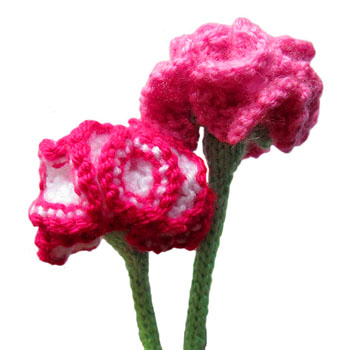Carnations (F3)

Carnations have a bit of a bad reputation with some people, just because they're inexpensive and widely available. Personally I like their cheerful ruffleyness. If you're not a fan, don't think of this as a carnation pattern, think of it as a hyperbolic plane on a stick. The pattern is worked in the flat but uses a circular needle due to the large number of stitches needed, and double ended needles due to the i-cord stem.
A printable version of this pattern is available.
You will need:
- scraps of double knit
- covered wire
- gummed tape
- 2 x double ended knitting needles (2.75mm)
- circular needle (2.75mm)
- tapestry needle
- scissors
- wire cutters
Pattern:
(A list of abbreviations is available.)
Stem & Sepals
Cast on 5sts in green. I-cord 16-20cm to form the stem.
Work the following in the flat, turning the knitting at the end of each row.
- Row 1: kfb, k4 (6)
- Row 2: pfb, p5 (7)
- Row 3: kfb, k6 (8)
- Row 4: pfb, p7 (9)
- Row 5: kfb, k8 (10)
- Row 6: p –
- Row 7: k –
- Row 8: p –
Repeat the following bullet points until no stitches remains (five points are formed).
- Cast on 2 sts
- Cast off 4 sts
- If your cast off method leaves a stitch on the RH-needle, transfer it back to the LH-needle.
Flower
Cast on 256 sts on a circular needle.
Work as follows in the flat.
- Row 1 (and all odd rows): k –
- Row 2: k2tog x 128 (128)
- Row 4: k2tog x 64 (64)
- Row 6: k2tog x 32 (32)
- Row 7: k2tog x 16 (16)
- Row 10: k2tog x 8 (8)
- Row 12: p –
- Row 14: p –
Cast off.
Making Up:
Fold the cast off edge of the flower in half. Sew back and forth through the base of the flower (the portion worked in straight stocking stitch) so that the ruffles/petals are gathered together.

Cut a piece of wire the same length as the i-cord stem and cover each end with the gummed tape.
Arrange the sepals of the stem so that the knitting is wrapped around the gathered base of the flower.

Sew the top edge into place but leave the side open. Insert the wire into the i-cord stem and tuck it into the cast off edge of the flower. Sew up the side opening of the sepals.
Sew in any remaining loose ends.
Variations:
Colour change immediately after casting on for a variegated appearance. Different cast on methods will also affect the look of your flower.
Notes:
Needle/Yarn Size
As with most ODDknit patterns the yarn and needle sizes in the "you will need" section are just a guide. Feel free to improvise with whatever needles and yarn you have lying around - that's half the fun!
<<< See more Flowers
© 2013 All desgins and images are copyright of ODDknit. If you enjoy the content of this website, please consider buying me a coffee at the link below.





